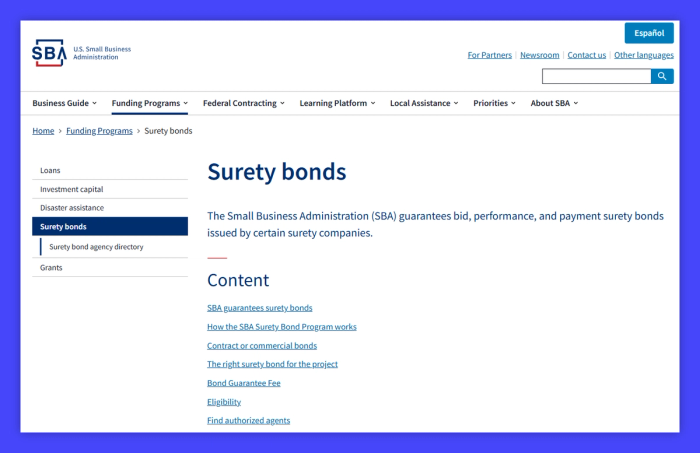When you run a small business, clients or regulators may ask for a license, proof of insurance, or a surety bond. In some industries, they’re legally required. In others, they help you land work and build connections faster.
This guide walks you through what this means and how to get them in place, so you’re covered and ready to take on new work.
What "licensed, bonded, and insured" actually means
When a small business says it’s licensed, bonded, and insured, it means it’s covered with three different types of protection.
Licensed
A license shows your business meets the legal requirements to operate in your industry or state. This might mean registering with a local agency, passing an exam, or completing required training. In many trades – like construction or cosmetology – it’s not optional.
Insured
Business insurance protects your company from financial losses caused by accidents, damage, or lawsuits. For example, general liability insurance can cover legal costs if someone gets hurt on the job or if you damage a client’s property. You pay a regular premium, and when a covered issue happens, the insurer handles the payout and costs.
Bonded
A surety bond is a financial guarantee that you’ll meet your obligations. Whether that’s finishing a job or sticking to licensing rules. If you don’t, the bond provider pays the client, then recovers the amount from you. Bonds typically involve three parties:
- You (the principal) → the business making the commitment
- Your client or the state (the obligee) → the one needing assurance
- The bond company (the surety) → the financial backer
Insurance vs. bond: what’s the difference?
Insurance and bonds both protect your business, but in different ways and for different audiences.
Business insurance helps cover the costs if something goes wrong, like an injury, property damage, or a lawsuit. It protects you. You pay a premium, and if there’s a covered claim, your insurer pays, minus any deductible.
A bond, on the other hand, protects your client. It’s a guarantee that you’ll follow through on your obligations, whether that’s finishing a job or complying with regulations. If you don’t, the bond company pays your client and then collects the amount from you.
Why being bonded and insured matters for small businesses
Having the right protections in place isn’t a box-ticking exercise; it’s often what helps you win the job, stay compliant, and avoid costly setbacks.
#1 Clients trust you more when you’re covered
Many customers want proof that you're licensed, bonded, or insured - especially if you work in their homes or handle valuable property. It’s a sign that you take your work seriously and that you’re prepared if something goes wrong.
In some industries, it’s essential. For contractors, cleaners, or pet care providers, being bonded and insured is often the difference between getting the job and being passed over.
#2 It keeps you eligible for jobs and licenses
Plenty of industries and states require specific coverage before you can legally operate.
- Contractors often need a license bond to get approved by the state.
- If you have employees, most states require workers’ comp.
- For public-sector or commercial contracts, you’ll likely need proof of insurance or a surety bond.
Even smaller clients – like landlords or local shops – may ask for a certificate of insurance before signing a contract. These are baseline requirements if you want access to bigger opportunities.
If you're in the U.S., the Small Business Administration can help you qualify for certain bonds so you can bid on more jobs.

#3 It protects your income – and your reputation
An unexpected claim or accident can be expensive. Insurance helps you manage that risk.
Say you’re a handyman, and a ladder slips during a job, damaging a client’s appliance. If you’re insured, liability coverage takes care of the cost, so the expense doesn’t come out of your pocket.
Bonds help protect your reputation. If a project doesn’t go to plan and a client files a claim, the bond pays them directly. You’ll need to reimburse the surety, but you avoid court disputes and control how things get resolved.
How to get licensed, bonded, and insured
Getting covered might sound complex, but it doesn’t have to be. Here’s how to break it down into manageable steps.
Step 1: Understand what your business needs
Start by checking two things:
- What your state or local regulations require
- What your clients typically expect in your industry
Some businesses can’t operate legally without a license, bond, or specific insurance coverage. Others rely on these protections to win contracts, build trust, or meet client requirements.
For example, some states require contractors to carry a license bond. A property manager might ask for a certificate of insurance before signing a service agreement. Freight brokers may need a specific bond to move goods legally.
If you're unsure what's expected, check with your licensing board, industry association, or a local insurance broker.
Step 2: Get bonded
A surety bond is a financial guarantee that you’ll follow through on a job or comply with regulations. If you don’t, the bond provider pays your client and then collects the amount from you.
Here’s what the process looks like:
- Find a bond provider. You can use a bonding agent, an insurance broker, or an online platform that handles small business bonding.
- Apply and go through underwriting. The provider will evaluate your personal or business credit, financials, experience, and project details. The stronger your background, the lower your premium.
- Pay your premium. This is usually 1–5% of the bond amount. For example, a $10,000 license bond might cost $100–$500 per year. Higher-risk or high-value bonds can cost more, up to 15%.
- Get your bond certificate. Once you’re approved and paid up, you’ll receive an official certificate. Some agencies require you to file it with the state. Clients may also request it before awarding work.
Common bond types for small businesses include:
- License & permit bonds, often required to get licensed (e.g. auto dealers, contractors)
- Fidelity bonds, which protect clients if an employee steals from them
- Contractor bonds, which guarantee performance or payment on individual jobs
Not every business needs a bond, but if you’re in a regulated field or want to take on higher-value contracts, it’s often essential.
Step 3: Get insured
Insurance protects your business from financial hits, whether it’s a client accident, property damage, or a mistake in your service. Once you know what’s required and expected (see Step 1), the next step is choosing the right coverage for how you actually operate.
Start by mapping your risks:
- If you meet clients in person or work at job sites, you’ll likely need general liability insurance to cover injury or property damage.
- If you rent or own space or equipment, consider commercial property insurance.
- If you have employees, workers’ compensation is required in most states.
- If you drive for work, get commercial auto insurance.
- If you offer advice or professional services, professional liability insurance (also known as errors and omissions) protects you from client claims related to mistakes or missed deadlines.
Many small businesses bundle key coverage into a Business Owner’s Policy (BOP), which includes general liability and property insurance. It’s a simple way to save on premiums and reduce admin.
Next, work with a licensed commercial insurance agent—or use an online platform—to compare quotes. Be ready to share:
- What you do and where you operate
- Years in business
- Revenue and team size
- Claims history, if any
When comparing quotes, look past the price. Make sure you understand:
- Your coverage limits
- Your deductible (what you’ll pay before insurance kicks in)
- Any exclusions (what’s not covered)
Once you choose a policy, you’ll pay monthly or annually and receive your Certificate of Insurance (COI). This is your proof of coverage, and clients will often ask for it before signing a contract or letting you on-site.
How much do bonds and insurance cost
Costs vary depending on your industry, size, and risk, but here’s a general idea of what small businesses can expect to pay.
Business insurance costs
Most small businesses spend between a few hundred to a few thousand dollars per year on insurance. A few ballpark figures:
- General liability: Around $42/month (about $500/year)
- Business Owner’s Policy (BOP): Averages $57/month or $684/year
- Workers’ comp: Typically $45/month per employee, though it depends on your payroll and industry
High-risk industries – like construction or food service – tend to pay more. Service-based businesses usually land on the lower end.
Bond costs for small businesses
Surety bonds are often more affordable than insurance, especially if you have strong credit and a low-risk profile.
- Bond premiums typically range from 1% to 10% of the bond amount per year.
- A $10,000 bond might cost $100–$1,000/year, depending on your credit and business history.
- Higher-value or higher-risk bonds (like construction performance bonds) can reach up to 15%, or $15,000/year for a $100,000 bond.
For newer businesses or those with poor credit, some providers may ask for collateral.
According to Insureon:
- License and permit bonds can start at $10/month
- Fidelity bonds (which cover employee theft) average around $90/month
Don’t forget to renew!
Most policies and bonds run for 12 months. You’ll pay monthly or annually, and when the term ends, you’ll need to renew to stay protected.
Set a calendar reminder 30–60 days before your coverage expires.
Tips for staying bonded and insured
Getting covered is step one; keeping your coverage up to date is what helps your business stay protected over time. Here’s how to make that part easier.
Bundle where it makes sense
Many insurers offer package deals that combine general liability, property, and cyber coverage. A Business Owner’s Policy (BOP) is a popular option for small businesses as it simplifies your setup and often cuts costs.
The same goes for bonds. If you need both a license bond and a project-specific performance bond, working with a single provider can save time and reduce fees.
Keep your credit clean
For bonds, your credit score affects how much you’ll pay. Paying bills on time, keeping debt manageable, and checking your reports regularly can keep premiums lower.
On the insurance side, a clean claims history can mean lower rates at renewal. Safety protocols and clear client communication help prevent disputes - and help you avoid making claims in the first place.
Review your coverage yearly
As your business evolves, so should your coverage. Check in once a year to make sure everything still fits:
- New services or locations? You might need new coverage.
- Higher revenue? You may need to raise your limits.
- New equipment? Update your property policy.
The same logic applies to bonds. If you’re entering new markets or bidding on larger projects, your bonding requirements may shift, too.
Make it easy to show proof
Keep your Certificate of Insurance (COI) and bond documents handy. Clients, project managers, and regulators may ask for them before approving work.
Work with providers you trust
Choose insurers that are A-rated for financial strength, and bond companies that are Treasury-listed if you plan to take on public projects. A reliable provider makes a real difference when it’s time to file a claim or prove your credibility.
Conclusion
Clients and agencies often ask for proof of insurance or a bond before they sign a contract. Without it, small businesses risk losing work they’re qualified to do.
Getting licensed, bonded, and insured shows that your business is professional and ready to meet expectations.
Start by checking your state’s requirements and what your clients typically ask for. Then choose a provider who can help you put the right protections in place.
It’s a practical step that helps you take on bigger opportunities with confidence.
FAQ
Any business that handles client property, operates in a regulated industry, or works under a contract may need a bond. Common examples include contractors, auto dealers, cleaning services, freight brokers, and notary publics.
In many industries, you’ll need a license or permit bond to operate legally. Even when it’s not required, being bonded helps you qualify for more work and builds client confidence.
Most small businesses start with general liability insurance: it covers common risks like injuries or property damage.
From there, the right coverage depends on your setup:
- Retailers often need property insurance
- Service providers may need professional liability
- Businesses with staff usually need workers' comp
Liability insurance protects your business. If someone gets hurt or something goes wrong, it helps cover legal fees and damages.
A bond protects your client. It’s a guarantee that you’ll follow through on your obligations. If you don’t, the bond provider pays your client and then collects that amount from you.
Being bonded gives your clients a layer of protection if a job isn’t finished or agreed-upon terms aren’t met.
It can also be required to get licensed or approved for certain projects. Bonds like janitorial or fidelity bonds are especially useful for businesses working inside client spaces.
In short, it shows you’re accountable, and makes it easier for clients to choose you.



![Business statistics every business owner should know [2026]](https://cdn.sanity.io/images/poftgen7/production/5619faf6a65f53406d3e554c11c9e894402d4397-5760x3240.jpg?rect=5,0,5751,3240&w=300&h=169&q=75&fit=max&auto=format)
